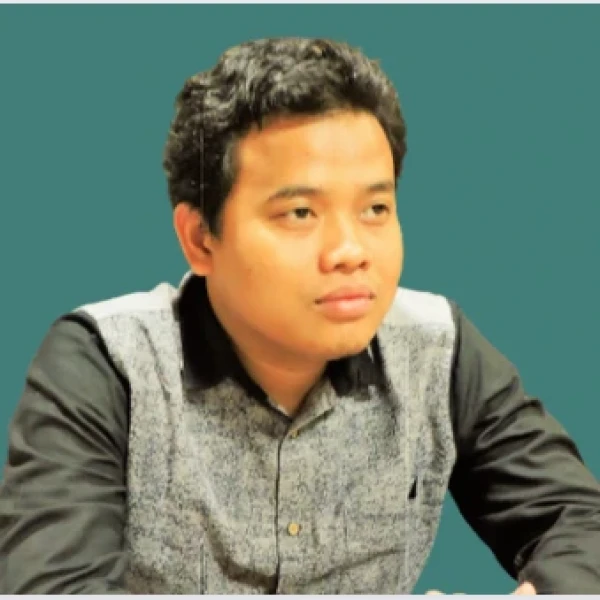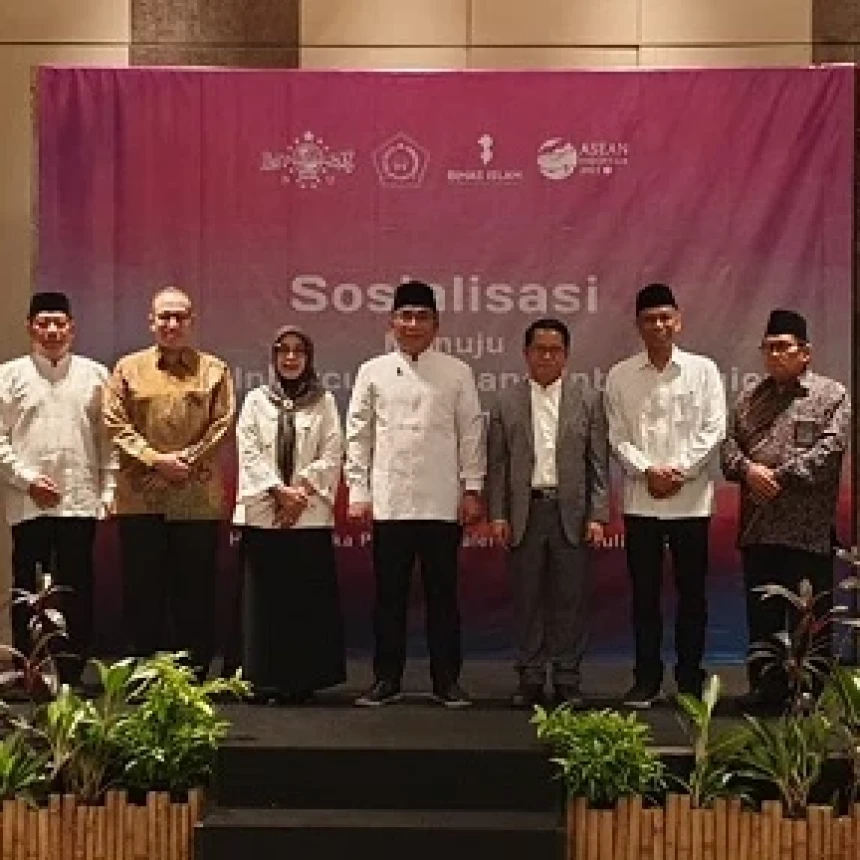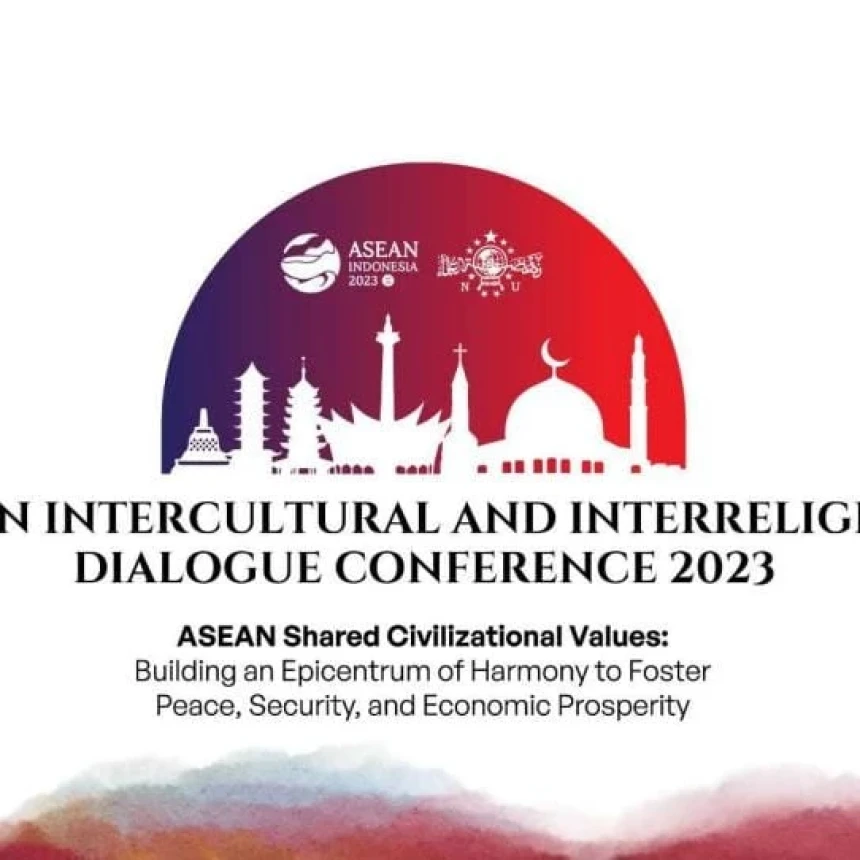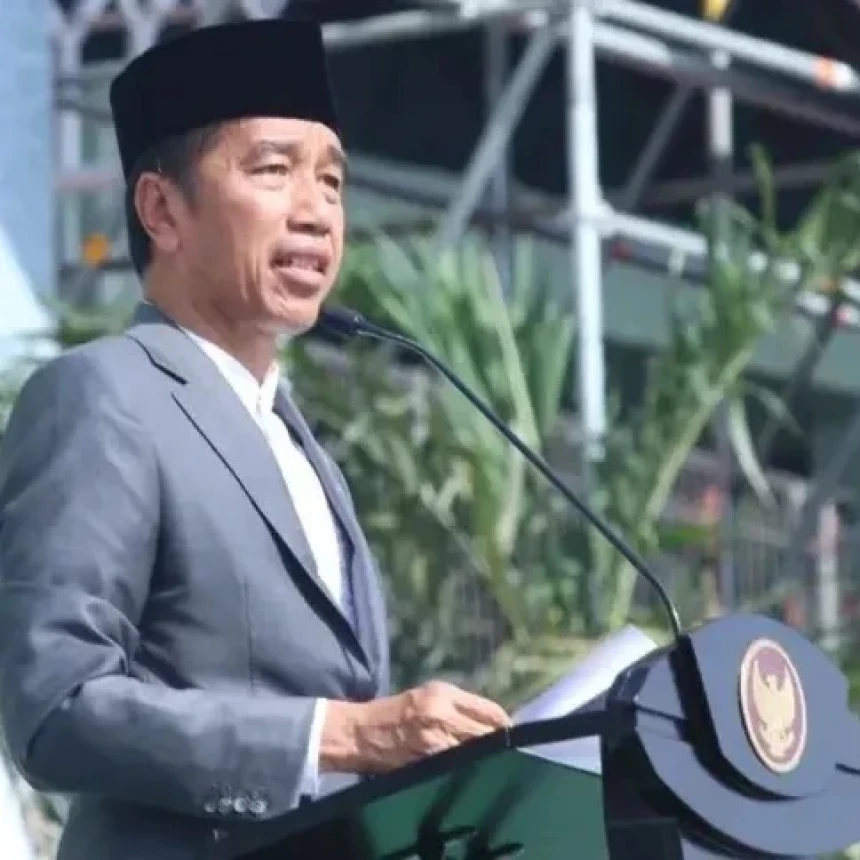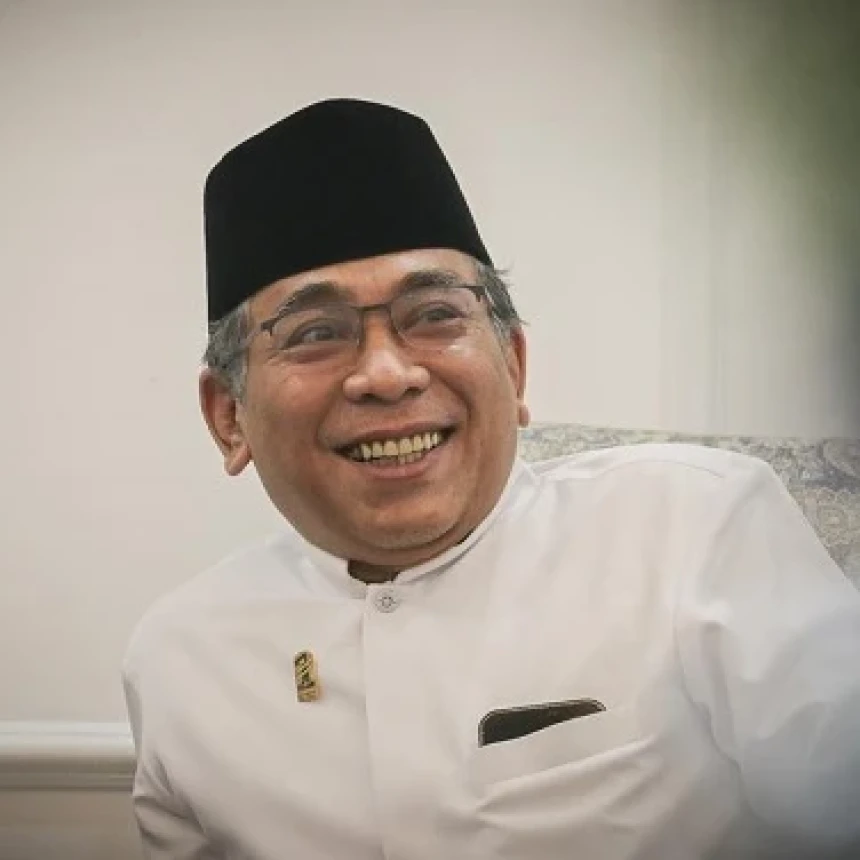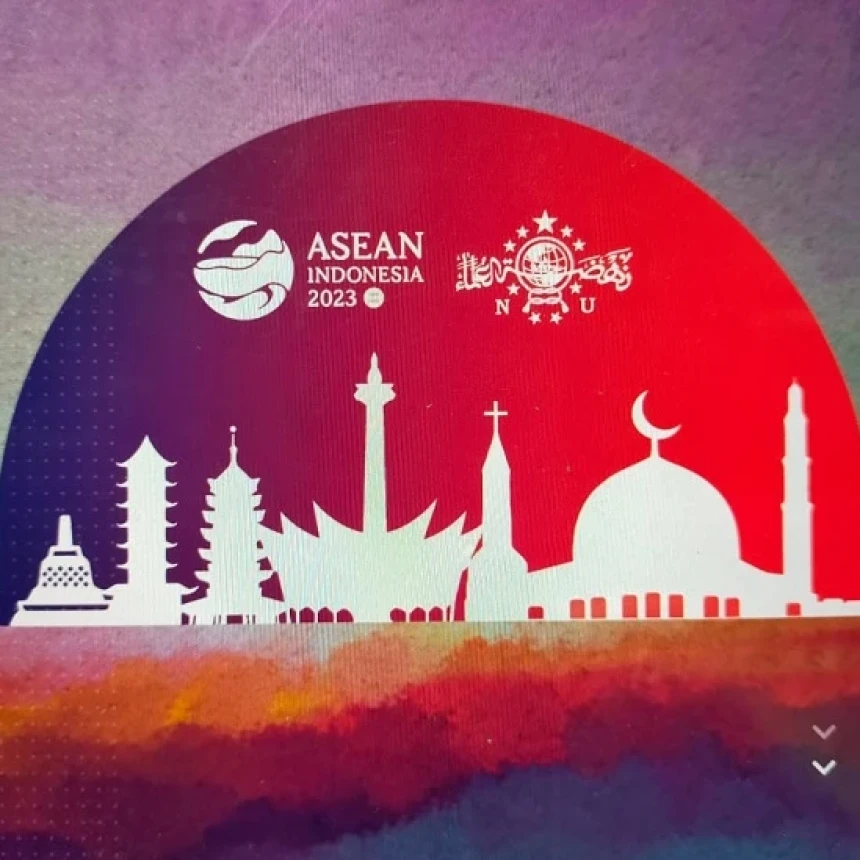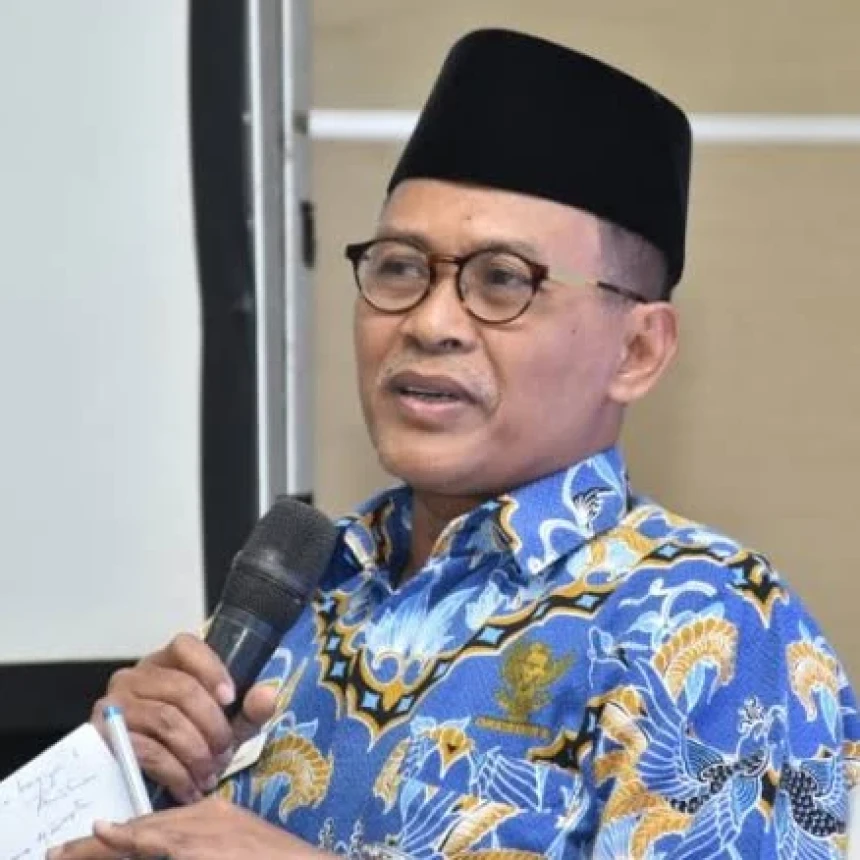Ketum PBNU Tutup ASEAN IIDC 2023, Hasilkan Deklarasi Jakarta
NU Online · Senin, 7 Agustus 2023 | 17:45 WIB
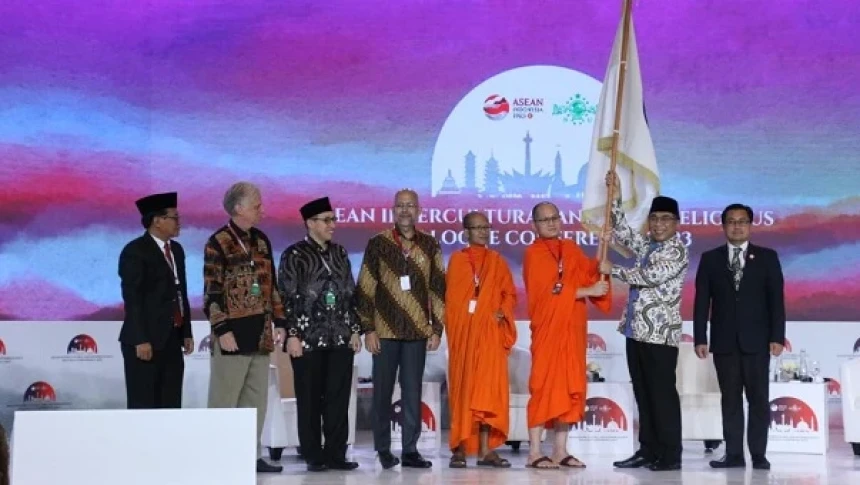
Ketua Umum PBNU, KH Yahya Cholil Staquf, Senin (7/8/2023) menyerahkan bendera pataka ASEAN IIDC secara simbolis kepada perwakilan tokoh agama dari Laos. Seremoni tersebut menandakan bahwa Kamboja merupakan host ASEAN IIDC berikutnya. (Foto: NU Online/Suwitno)
Patoni
Penulis
Jakarta, NU Online
Forum ASEAN Intercultural dan Interreligious Dialogue Conference atau ASEAN IIDC yang dilaksanakan di Hotel Ritz Carlton, Jakarta pada Senin (7/8/2023) menghasilkan Deklarasi ASEAN IIDC Jakarta atau ASEAN IIDC Declaration Jakarta.
Deklarasi seluruhnya berbahasa Inggris, dibacakan oleh Peneliti Senior National University of Singapore, Teresita Cruz del Rosario. Deklarasi berisi poin-poin penting tentang hubungan antar-manusia, perempuan dan pemuda, serta kerja sama antar-pemerintah dalam mengatasi setiap problem yang muncul di lingkup Asia Tenggara untuk perdamaian global.
Sebelum deklarasi dibacakan Teresita, Ketua Umum PBNU, KH Yahya Cholil Staquf atau Gus Yahya memberikan sambutan penutup ASEAN IIDC 2023. Ia menegaskan, inisiatif PBNU merupakan salah satu bentuk diplomasi publik.
"Saya atas nama Nahdlatul ulama telah menyatakan bahwa diplomasi publik merupakan bagian penting dari agenda Nahdlatul Ulama. Dan diplomasi NU benar-benar jujur. Yang ingin kami kejar adalah solusi. Dan solusi tidak akan pernah bisa dicapai tanpa menghadapi masalah, mengakui masalahnya. Inilah yang kami lakukan hari ini," tegas Gus Yahya.
"Saya ingin mengucapkan terima kasih kepada semua partisipan dan pembicara atas apa yang telah kita lakukan hari ini, saya percaya apa yang kita capai hari ini adalah sesuatu yang sangat berarti dalam perjuangan umat manusia untuk masa depan yang lebih baik, kemanusiaan dan Peradaban global," imbuh Gus Yahya.
Selesai menyampaikan sambutan, Gus Yahya menyerahkan bendera pataka ASEAN IIDC secara simbolis kepada perwakilan tokoh agama dari Laos. Seremoni tersebut menandakan bahwa Laos merupakan host ASEAN IIDC berikutnya.
Berikut isi lengkap ASEAN IIDC Declaration Jakarta:
We, religious and cultural leaders from every ASEAN Member State — as well as from ASEAN Plus and other nations — have convened in Jakarta, Indonesia, under the auspices of the world’s largest Muslim organization, Indonesia’s Nahdlatul Ulama, with the support of the Government of Indonesia during its Chairmanship of ASEAN.
Having carefully considered the present state of affairs within our region and the world at large, as well as the rich civilizational legacy that we have inherited from past generations, we do hereby observe and acknowledge that:
• The nations of ASEAN and the Indo-Pacific region are increasingly important actors upon the world stage;
• At the same time, geopolitical and socio-economic developments — including ethnic and religious conflict, poverty, environmental degradation, and health emergencies — pose significant challenges to the maintenance of security, peace, and prosperity in the Indo-Pacific and worldwide;
• To successfully navigate these challenges, governments need the cooperation of stakeholders at every level of society, including effective engagement with, and support from, religious organizations endowed with spiritual authority and a mass following;
• ASEAN has the potential to facilitate the peaceful navigation of regional challenges, as it consists of countries that have traditionally shared a similar set of civilizational values, deeply rooted within their respective societies. These values foster a culture of tolerance and harmony, while reducing conflict between groups;
• Moral education, the development of noble character, and the practice of virtue were integral to the ways of life of local peoples across Southeast Asia and to the indigenization of Islam, Christianity, Hinduism, Buddhism, Taoism, and other religions following their arrival within the region;
• It is of the upmost importance that ASEAN Member States cooperate to revitalize the civilizational mentality, or worldview, that was long characteristic of Southeast Asia prior to the modern era. This civilizational mentality is characterized by a willingness to accept differences while preserving and strengthening harmony among society’s diverse elements;
• The long history of largely peaceful co-existence between various cultures in Southeast Asia offers a model through which ASEAN and its Member States may address a wide range of geopolitical and socio-economic developments that pose significant challenges to the security, peace, and prosperity of Southeast Asia, while hampering the achievement of ASEAN’s SDG 2030 and post-2030 goals;
• Open, constructive, and respectful interreligious and intercultural dialogue is essential if we are to promote and cultivate tolerance, respect, and a culture of peace, and thereby facilitate better understanding among peoples within our individual nations, within ASEAN, and throughout the world at large;
• Various initiatives already underway — including the work of the United Nations, the UN Alliance of Civilizations, and the Bali Democracy Forum provide a welcome contribution to strengthening tolerance, democracy, and respect for human rights through interreligious and intercultural dialogue. Noteworthy among these initiatives are:
- UN resolutions on Promoting a culture of peace and tolerance to safeguard religious sites (A/RES/75/258); Promotion of interreligious and intercultural dialogue, understanding and cooperation for peace (A/RES/75/26); Promoting interreligious and intercultural dialogue and tolerance in countering hate speech (A/RES/73/328); Resolution 2686 (2023) Adopted by the Security Council at its 9347th meeting, on 14 June 2023 (S/RES/2686); fostering a Culture of peace (A/RES/51/101); and the establishment of World Interfaith Harmony Week (A/RES/65/5);
- A declaration by ASEAN leaders titled Culture of Prevention (CoP) for a Peaceful, Inclusive, Resilient, Healthy and Harmonious Society and plans of action for promoting this agenda;
- The ASEAN Community’s Post-2025 Vision and attendant documents — as envisioned in the Ha Noi Declaration on the ASEAN Community’s Post-2025 Vision — including the ongoing work of the High-Level Task Force on the ASEAN Community’s Post-2025 Vision (HLTF-ACV), as well as the SDG 2030 and post-2030 agenda;
- The Abu Dhabi Declaration on Human Fraternity for World Peace and Living Together; and
- The establishment, in June 2021, of the “Center for Shared Civilizational Values” by the world’s largest Muslim organization, Indonesia’s Nahdlatul Ulama.
Deeply conscious of these circumstances and trends, we — religious and cultural leaders from every ASEAN Member State, as well as from ASEAN Plus and other nations — do hereby:
i. Agree to assume shared responsibility to foster an inclusive, sustainable, resilient, dynamic, and harmonious ASEAN community that is capable of peacefully navigating current and future challenges within the region and beyond;
ii. Invite other religious, cultural, and political leaders, as well as people of goodwill of every faith and nation, to join in transforming Southeast Asia into an epicentrum of harmony based on a legacy of shared civilizational values; and
iii. Pledge to cooperate in consolidating the ASEAN region as a cohesive, vital, and proactive civilizational sphere, which functions as a powerful, independent pillar of support for a rules-based international order.
In pursuit of these objectives the ASEAN Intercultural and Interreligious Dialogue Conference 2023 proposes the development of an operational framework to advance this agenda in the following distinct areas:
People-to-people connectivity
iv. Encourage religious and cultural leaders to cooperate with governments in fostering mutual understanding and harmony among the diverse religious communities and cultures of ASEAN, by enhancing people-to-people connectivity at the national, regional, and global levels;
v. Invite the peoples and governments of ASEAN to join in facilitating “the emergence of a global movement, in which people of goodwill of every faith and nation will help bring the world’s geopolitical and economic power structures into alignment with the highest moral and spiritual values, for the sake of all humanity” (Kyai Haji Yahya Cholil Staquf, General Chairman of the Nahdlatul Ulama Central Board);
vi. Acknowledge and embrace our responsibility to help ensure that our respective religions function as a genuine and dynamic source of solutions, rather than problems, upon the world stage;
vii. Agree to forge concrete avenues of cooperation among ASEAN’s diverse religious communities, based upon shared moral and spiritual values;
viii. Invite like-minded cultural and religious leaders throughout Southeast Asia to foster a renewed appreciation for the principles and respect for pluralism that were once defining features of the region;
Women and youth
ix. Affirm the vital importance of women and their role within society, including but not limited to the inculcation of noble values within each successive generation of youth;
x. Recognize that effective character education provides a holistic approach to addressing numerous social problems, because mature, responsible individuals contribute to the well-being of society;
xi. Urge government leaders to strengthen character education within the national curricula of ASEAN Member States, so that youth may successfully adapt to the modern world, while simultaneously developing a way of life that imparts the inner resources, character, and resilience required to overcome the negative influences of modernity and globalization, including socio-cultural dislocation; alienation from family and society at large; criminality and drug use; educational failure; violent extremism; and the rise of psychological illness among youth;
xii. Encourage youth and young adults to participate actively in efforts to build intercultural and interreligious understanding and harmony within the societies of ASEAN and the region as a whole;
Intergovernmental cooperation
xiii. Commit to help develop and implement concrete initiatives and government policies that will build bridges of mutual understanding and respect between the peoples and cultures of ASEAN, the Indo-Pacific region, and the world at large;
xiv. Invite governments and civil society institutions to help project ASEAN's cultural and religious soft power globally, through the Movement for Shared Civilizational Values, which seeks to preserve and strengthen a rules-based international order founded upon universal ethics and humanitarian values;
xv. Express our full support for the Government of Indonesia’s Chairmanship of ASEAN 2023, including its efforts to ensure that the Association of Southeast Asian Nations remains credible, relevant, and beneficial for its people, the region, and the world at large, while continuing to serve as an epicentrum of growth and prosperity;
xvi. Express our appreciation to the Government of Indonesia for its support in convening the ASEAN Intercultural and Interreligious Dialogue Conference (IIDC) as one of several public events held under Indonesia’s ASEAN Chairmanship in 2023; and
xvii. Emphasize the importance of a regular, institutionalized mechanism to discuss and promote intercultural and interreligious cooperation in Southeast Asia, and explore possible avenues within the structures of ASEAN to establish the ASEAN Intercultural and Interreligious Dialogue Conference as an annual forum, in order to facilitate ongoing cooperation between individuals, religious communities, civil society organizations, media outlets, and governments throughout ASEAN, ASEAN Plus Member States, and beyond.
Jakarta, Indonesia, 7 August 2023
Terpopuler
1
Khutbah Jumat: Menyiapkan Bekal Akhirat Sebelum Datang Kematian
2
Menyelesaikan Polemik Nasab Ba'alawi di Indonesia
3
Khutbah Jumat: Tetap Tenang dan Berpikir jernih di Tengah Arus Teknologi Informasi
4
Resmi Dilantik, Berikut Susunan Lengkap Pengurus PP ISNU Masa Khidmah 2025-2030
5
Rekening Bank Tak Aktif 3 Bulan Terancam Diblokir, PPATK Klaim untuk Lindungi Masyarakat
6
Khutbah Jumat: Perhatian Islam Terhadap Kesehatan Badan
Terkini
Lihat Semua

